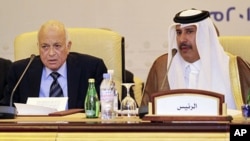Arab League officials announced Thursday that they will present a palm for resolving Syria's months-long unrest to the U.N. Security Council on Monday. Meanwhile, Syrian opposition forces say government troops stormed the Damascus suburb of Douma in an attempt to crush rebel forces.
Arab League chief Nabil Elaraby says he and Qatar's prime minister will jointly ask the U.N. Security Council to endorse a League plan which calls for Syrian President Bashar al-Assad to transfer power to a deputy and form a national unity government to prepare for national elections. Syria has rejected the League plan.
Speaking in Cairo, Elaraby said he will depart for the U.N.'s New York headquarters on Saturday.
Violence continued Thursday in Syria.
Syrian government tanks and artillery pounded the Damascus suburb of Douma capturing it from rebel soldiers and arresting scores of people. Opposition websites also reported that government forces attacked other suburbs of the capital.
A widespread government offensive against opposition strongholds in the cities of Hama, Homs and Idlib began Wednesday, amid reports of heavy resistance. Videos on opposition websites showed pocked walls and storefronts in Hama from government shelling.
Hilal Khashan, who teaches political science at the American University of Beirut, says the Syrian government's latest military offensive is a sign of increasing desperation:
“The intensity of the uprising has kept increasing week after week. So I think the regime is desperate and the latest moves by the government to try to clamp on the opposition as soon as possible will backfire in my opinion. I assume that there will be more army defections as the result of the use of excessive firepower," Khashan said.
Joshua Landis, who teaches at the University of Oklahoma and edits the website “Syria Comment,” says that rebel soldiers calling themselves the “Free Syrian Army” are disorganized and unable to match the much stronger government forces:
“It's a bunch of little militias that have popped up in different towns and are taking no central orders. They call themselves the Free Syrian Army, but they're not coordinating their military efforts. If they were coordinating, they'd all rise up and fight the Syrian Army at once," Landis said.
The experts say the central government is progressively weakening as the opposition grows stronger.
Landis predicts Syria will see an increasingly sectarian conflict, one resembling the civil strife of recent years in Lebanon and Iraq. But in the short term, he says the Syrian opposition is “riven by dissension,” while the government enjoys weak support from those who fear civil war.
|
Join the conversation on our social journalism site - Middle East Voices. Follow our Middle East reports on Twitter and discuss them on our Facebook page. |




